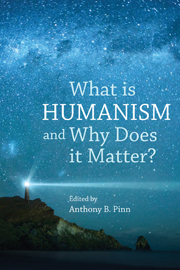Book contents
- Frontmatter
- Contents
- Preface
- Acknowledgments
- Part I What Is Humanism?
- Part II Why Doest Humanism Matter?
- Part III What Do We Do With Humanism?
- 6 Beyond Kumbaya: Culturally Relevant Humanism in an Age of “Posts”
- 7 Humanism and the Bib Problem
- 8 Growing Humanism in a Faith-Dominated Society
- Appendix: Humanist Manifestos
- Notes
- Select Bibliography
- Contributors
- Index
7 - Humanism and the Bib Problem
from Part III - What Do We Do With Humanism?
- Frontmatter
- Contents
- Preface
- Acknowledgments
- Part I What Is Humanism?
- Part II Why Doest Humanism Matter?
- Part III What Do We Do With Humanism?
- 6 Beyond Kumbaya: Culturally Relevant Humanism in an Age of “Posts”
- 7 Humanism and the Bib Problem
- 8 Growing Humanism in a Faith-Dominated Society
- Appendix: Humanist Manifestos
- Notes
- Select Bibliography
- Contributors
- Index
Summary
Once in a great while, a single sentence rockets off the page and brands itself permanently on my mind. One such gift appears early in Jennifer Michael Hecht's book Doubt—a simple sentence that captures the central human problem: “We live in a meaning-rupture because we are human and the universe is not.”
I am both conscious and mortal. That's a bad combination that puts me—and, incidentally, you—in a rather desperate fix. It's not unreasonable to see traditional religion as first and foremost a response to this galling conundrum, solving the Big Problem of death by declaring it unacceptable, and therefore untrue. Religion repairs Hecht's meaning-rupture by denying it, giving the universe a brain and a heart after all, so we in turn can have courage and a home.
A neat and useful trick if you can manage it. I never quite could.
It's not that I care less than most about this predicament. My own feeling about death is straightforward: I am opposed to it. True, there is beauty to be found in my return to the universe whence I came, even real consolation in the idea of utter, untroubled annihilation. My own children have been fascinated by the knowledge that every atom in their bodies has been here since the beginning of time, part of planets and suns and animals and plants and people before coming together to make them. That every bit of us returns to the earth to fuel the ongoing story of life is a gorgeous natural symmetry that never ceases to move them when they are reminded of it.
- Type
- Chapter
- Information
- What is Humanism, and Why Does it Matter? , pp. 108 - 117Publisher: Acumen PublishingPrint publication year: 2013



